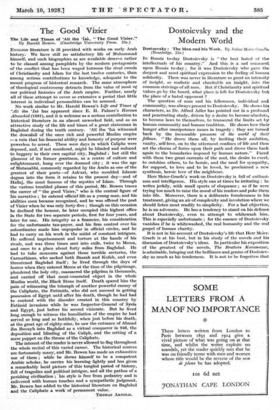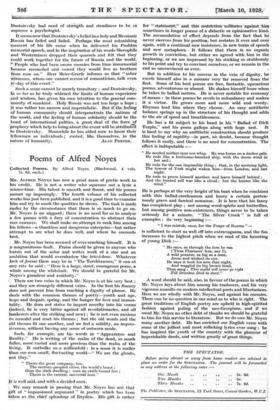Dostoievsky and the Modern World
Dostoevsky : The Man and his Work. By Julius Meier-Craefo: (Routledge. 25s.) IN Russia to-day Dostoievsky is " the best hated of the intellectuals of his country.". And this is a sad comment upon Russia to-day ; for it was Dostoievsky who gave the deepest and most spiritual expression to the feeling of human solidarity. There was never in literature so great an intensity of insight, so realistic and charitable an insight, into the common strivings of all men.. But if Christianity and spiritual values go by the board, what place is left for Dostoievsky but the place of a hated opponent ?
The question of man and his fellowmen, individual and community, was always present to Dostoievsky. He shows his characteri, as Dr. Alfred Adler has pointed out in a profound and penetrating study, driven by a desire to become absolute, to become laws to themselves, to transcend the limits set by human community and human tradition. He shows how their hunger after omnipotence issues in tragedy ; they are turned back by the inexorable pressure of the world of their fellows. "He drove them all, by inciting their ambition, vanity, self-love, on to the uttermost confines of life and then set the chorus of furies upon their path and drove them back again to the boundaries imposed by human nature." Faced with these two great currents of the soul, the desire to excel, to outshine others, to be heroic, and the need for sympathy, for support, to love and to be loved, he proclaimed a new synthesis, heroic love of the neighbour.
Herr Meier-Graefe's work on Dostoievsky is full of enthusi- asm and intelligence. His style can at times be irritating ; he writes jerkily, with small spurts of eloquence ; as if he were trying too much to raise the mood of his readers and poke them into life. Moreover, there is a deliberate formlessness in his treatment, giving an air of complexity and involution where we should listen most readily to simplicity. For a last objection, he is an advocate. He has a tendency to stand on his defence about Dostoievsky, even to attempt to whitewash him. This is especially unfortunate ; for the essence of Dostoievsky vanishes if he is whitewashed, the real humanity and the real gospel of human charity.
It is not in his account of Dostoievsky's life that Herr Meier- Graefe is at his best, but in his study of the novels and his discussion of Dostoievsky's ideas. In particular his exposition of the greatest of the novels, The Brothers Karam:tau, is admirable, bringing out the brilliance and genius of Dostoiev- sky as much as his tenderness. It is not to be forgotten that Dostoievsky had need of strength and steadiness to be so supreme a psychologist.
It seems now that Dostoievsky's belief in a holy and Messianic Russia has failed and faded. Perhaps the most astonishing moment of his life came when he delivered his Pushkin Memorial speech, and in the inspiration of his words Slavophils and Westernizers dropped their quarrels and felt that they could work together for the future of Russia and the world.
People who had been sworn enemies from time immemorial became reconciled and vowed they would live as brothers from now on." Herr Meier-Graefe informs us that " sober witnesses, whom one cannot accuse of romanticism, talk even today of this event."
Such a scene cannot be merely transitory ; and Dostoievsky, ln so far as he truly widened the limits of human experience and wisdom, has given his own intuition to the general com- *unity of mankind. Holy Russia was not too Iarge a hope ; it was rather too narrow and imperialistic. But if the feeling of human community should interpenetrate the nations of the world, and the feeling of human solidarity should be the bond of international politics, a great deal of the force of prophecy which help to bring about the event will be attributed to Dostoievsky. Meanwhile he has aided men to know their fellowmen as individuals ; rooted, like themselves, in the



























































 Previous page
Previous page